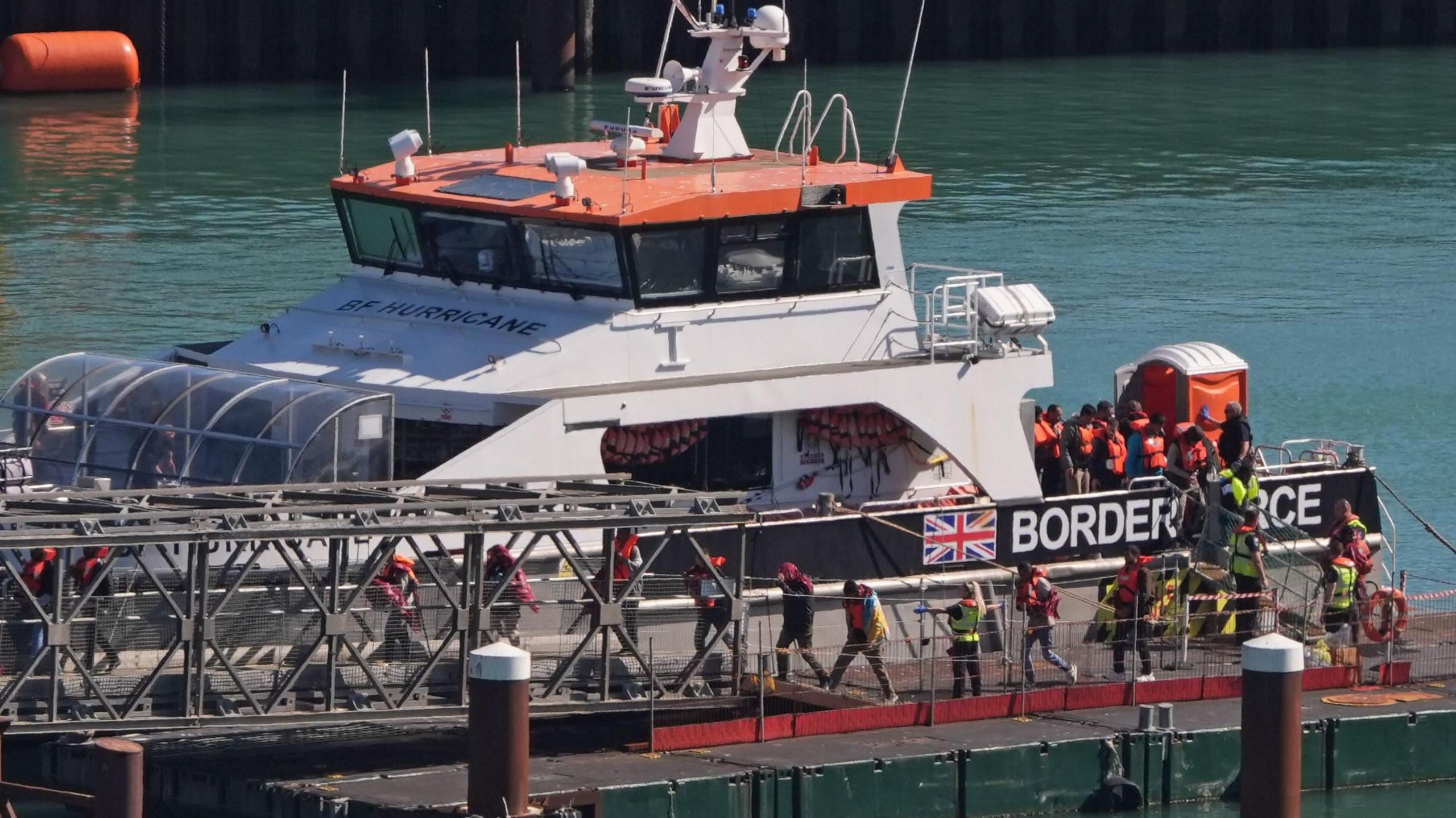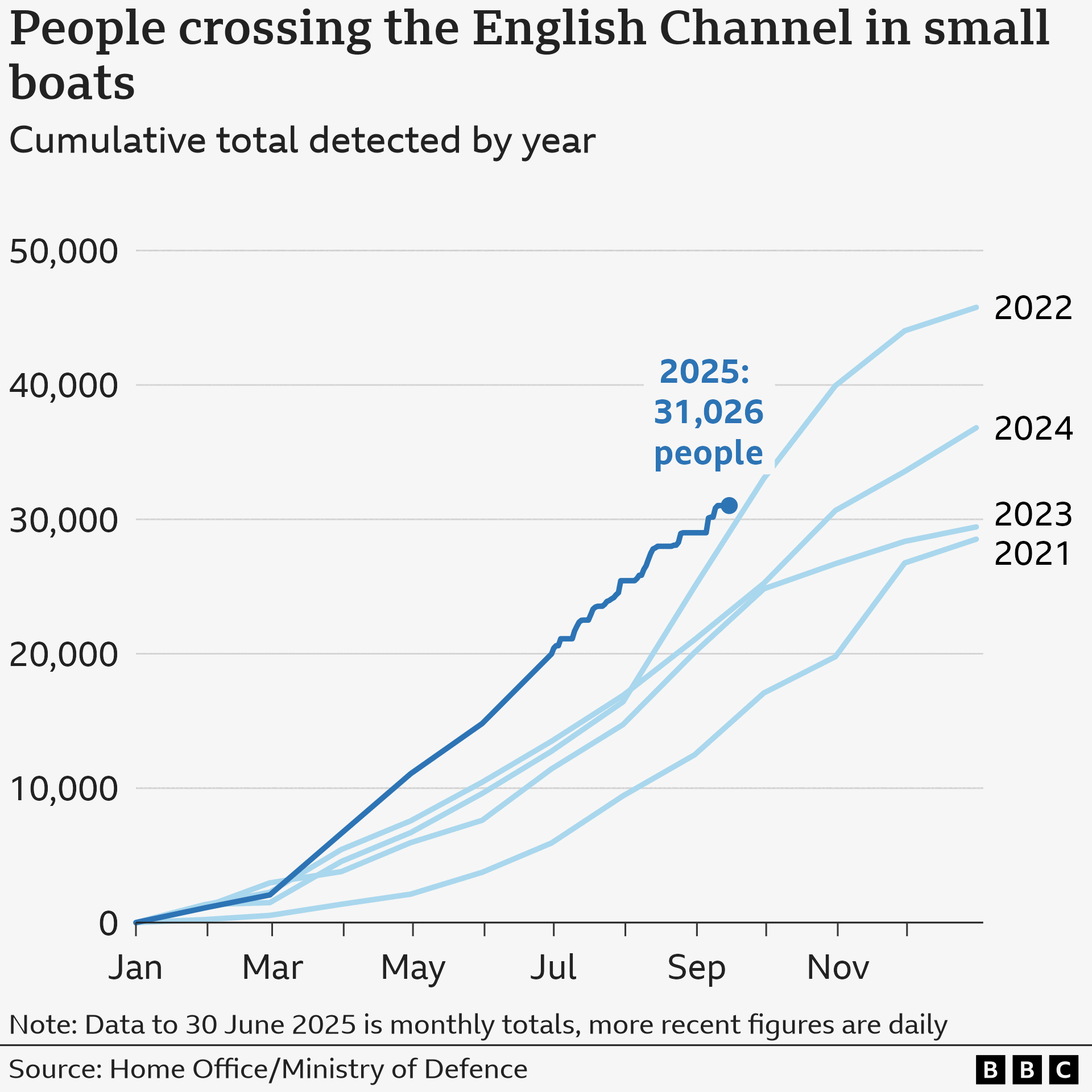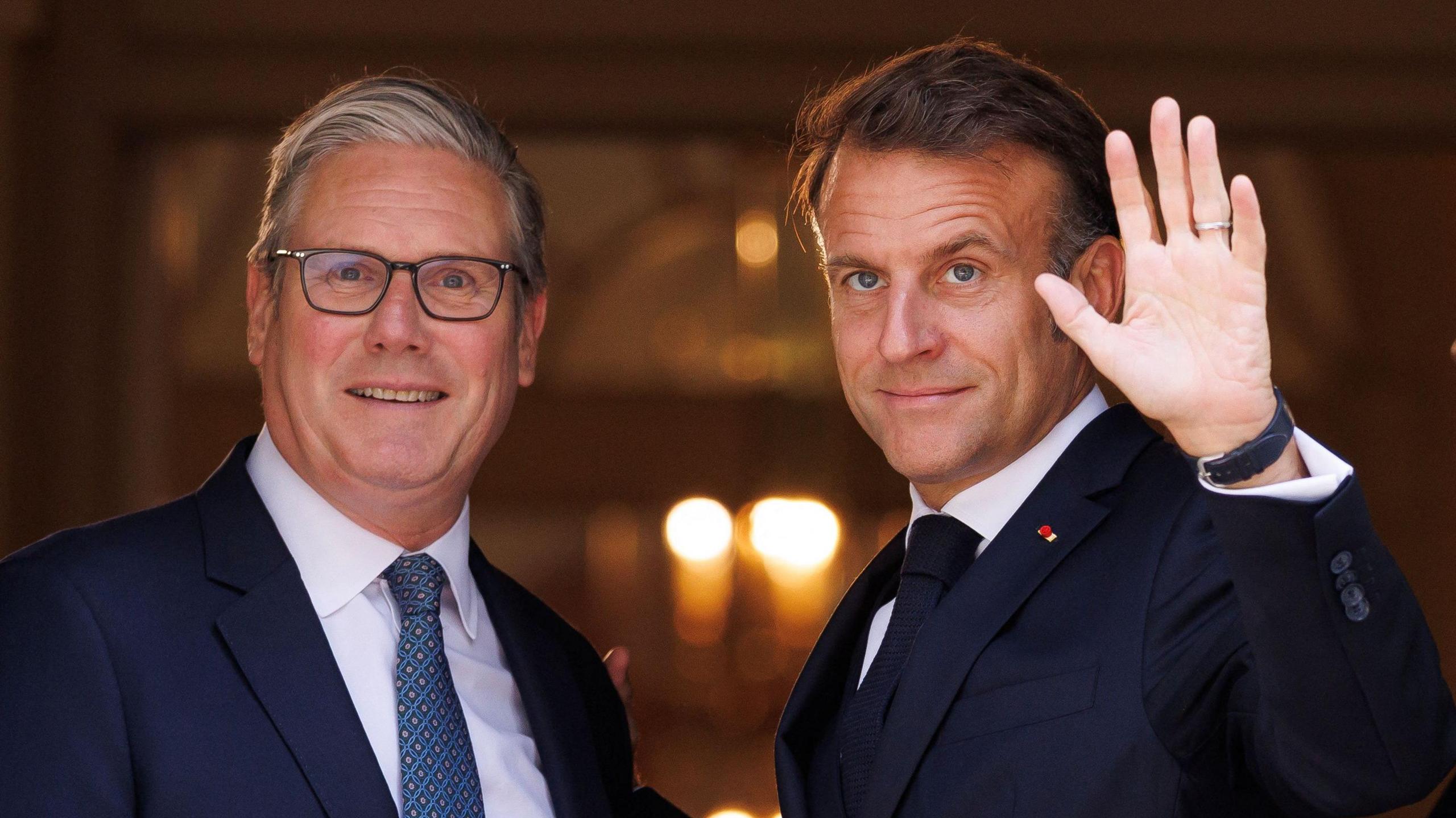Eritrean man wins block on removal to France under 'one in, one out' deal

- Published
An Eritrean man who arrived in the UK by small boat has won a last-minute legal claim to temporarily block his removal to France.
The 25-year-old was due to be returned on Wednesday under the "one in, one out" returns pilot scheme agreed in July between the UK and France.
In the first legal challenge against the deal, in the High Court in London, his lawyers argued he needed more time to present evidence that he might have been the victim of modern-day slavery - and the decision to remove him had been rushed.
Science Secretary Liz Kendall told the BBC the ruling was "an interim judgement on one individual" which would not halt the deal.
"It will not stop this really important deal from going ahead, a deal that says if you come to this country illegally, you can and you will be deported," Kendall said.
She said ministers never claimed the deal would be "a silver bullet to tackle all of the problems" but insisted the Home Secretary Shabana Mahmood was determined to make sure it worked.
The injunction raises serious questions about whether other migrants allocated to flights will use the same grounds to delay or block their removal.
Lawyers for the Home Office had argued that he could have claimed asylum in France. They added that delaying his departure could encourage others allocated to the return flights this week to make similar claims, and undermine the public interest in deterring lethal small boat crossings.
But during the hearing, it emerged that while the home secretary's own officials had rejected his claim that he was a victim of slavery, they had also said in a letter today that he had a right to make further representations – and they would not expect him to do that from France.
Mr Justice Sheldon, who rejected the man's claim that he would be left homeless and destitute in France, said that he would nevertheless have to temporarily block the man's departure in light of that development.
"There is a serious issue to be tried in relation to the trafficking claim and whether or not the Secretary of State has carried out her investigatory duties in a lawful manner," he said.
"If there was a reasonable suspicion that he was trafficked - and that does not mean trafficked in or from France - that would amount to a statutory bar to removal for at least a short period of time."
The judge said the man's lawyers must do all that is possible to make further representations within 14 days, so that his case can be finalised at a future hearing.
A spokesperson for the Home Office told the BBC that the government expected the first returns to take place imminently and that the interim ruling would not prevent delivery of the wider policy.
But Danny Shaw, a former Home Office adviser, said the government appeared to have selected people for removal who had "very recently arrived on small boats in the UK and because of that, there hasn't been a lot of time to investigate the background of those individuals".
Shaw said that was what had happened in the case of the Eritrean man, in which the judge ruled he needed 14 days to investigate whether he had been trafficked.
Imogen Townley, a solicitor at Wilson LLP who has represented asylum seekers, said there seemed to be "quite an arbitrary and chaotic approach to selecting people arriving on small boats".
She said while she accepted legal claims holding up removals would be frustrating for the government, it was "worth it to have due process and a fair system".
"It's not realistic to think that individuals caught up in the scheme do not have individual circumstances [preventing their removal]," Townley said.
She said she did not think the UK-France deal had been scuppered because there was not an "overarching problem" with the scheme's design.
Migrant return flights to France set to start next week
- Published13 September
How many people cross the Channel in small boats?
- Published22 October
Kemi Badenoch responded to news of the injunction with "we told you so".
Speaking to LBC, the Conservative leader called for "some tough laws" and said "we are basically turning our country into a refuge for anyone who may have even the slightest bit of unhappiness in any other country".
Reform leader Nigel Farage said that even if the policy worked, it would not lead to lower migration numbers as "one in, one out, and with another one in, still means plus one for everyone that crosses the Channel".
Papers logged at the High Court show that the man, who cannot be named for legal reasons, left Ethiopia for Europe two years ago, arriving in Italy in April 2025.
A month later, he left for France where he was assisted by charities including the Red Cross, before his mother paid $1,400 (£1,024) to smugglers for his Channel crossing to the UK.
More than 30,000 people have crossed the Channel in small boats so far this year.
It is the earliest point in a calendar year this figure has been passed since data on crossings was first reported in 2018.

The "one in, one out" scheme was announced by Prime Minister Keir Starmer and French President Emmanuel Macron in July.
Under the treaty, France agreed to take back migrants who had travelled to the UK by small boat and had their asylum claim withdrawn or declared inadmissible.
For each person returned to France, the UK would accept someone with a case for protection as a refugee who has not attempted to cross the Channel.
No-one has yet been removed under the scheme. The first returns to France had been expected to begin from Tuesday.
Over the last fortnight, some migrants being held in immigration removal centres received letters that said they would be put on a scheduled Air France flight departing from Heathrow Airport for Paris at 9am this morning.
However, a number of sources told the BBC that some of the potential passengers had been told their departure would be deferred as further representations about their cases were made.
Asked by reporters - before the High Court ruling - if the scheme was a "shambles", a government spokesperson said "no".
They added that the government was "confident in the legal basis for this pilot, we've taken steps to ensure it's compliant with domestic and international law; as with any policy, we're prepared to respond to any legal scrutiny that occurs".
It is likely to reignite the discussion about the role of the European Convention on Human Rights, which has been a lightning rod for the political right since before the previous government's failed Rwanda plan.
The Conservatives will set our their position on the ECHR at their conference next month, with a wide expectation that they will come down on the side of withdrawing.
Sir Keir has said that is not something he is willing to do, so the pressure will be on for his government to show they can make their returns scheme work within it.
Get in touch
Your Voice, Your BBC News: What story do you want BBC News to cover?

